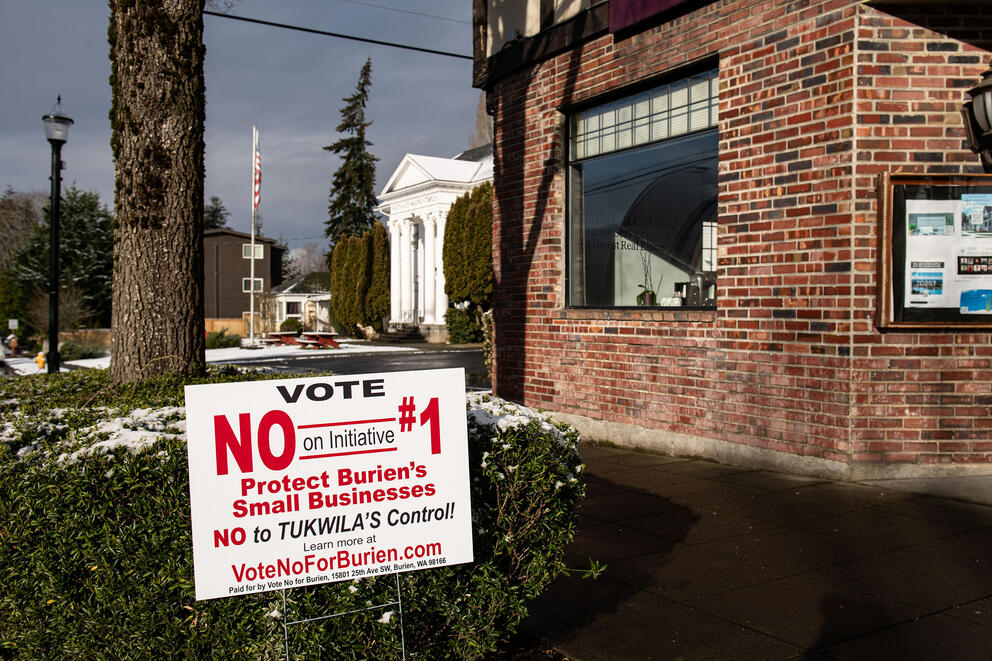This article originally appeared in the Washington State Standard.
A federal judge in Seattle on Friday temporarily paused President Donald Trump’s executive order seeking to stop federal funding for hospitals providing gender-affirming care for young people.
The temporary restraining order issued by U.S. District Court Judge Lauren King is the second on this issue in as many days. On Thursday, a federal judge in Maryland issued a 14-day nationwide pause in a case brought by several transgender youth along with parents and advocacy groups.
This case was filed last week by Washington, Oregon and Minnesota, along with three anonymous doctors representing themselves and their patients.
In granting the order, King said Trump’s order likely won’t withstand “constitutional scrutiny.”
Late last month, Trump issued an executive order entitled “Protecting Children from Chemical and Surgical Mutilation.” The order states “it is the policy of the United States that it will not fund, sponsor, promote, assist, or support the so-called ‘transition’ of a child from one sex to another.”
Trump’s order seeks to end grants to hospitals and medical schools providing gender-affirming care to people under age 19.
Washington Attorney General Nick Brown argues the order is unconstitutional in several ways.
In court filings, the states have said the order violates the 10th Amendment by trying to regulate medical care in the states, as well as the equal protection guarantee against discrimination in the 5th Amendment to the U.S. Constitution.
King repeatedly pressed the Trump administration’s attorney, Vinita Andrapalliyal, to explain what treatments covered in the executive order apply to both transgender and cisgender people. Andrapalliyal couldn’t provide one.
The judge, who former President Joe Biden nominated for the bench in 2021, went on to push Andrapalliyal to answer numerous other questions about the meaning of the executive order. The attorney couldn’t answer them.
“You’re not answering my questions,” King said. “This is extremely frustrating.”
The states say cutting off federal funding could be devastating. For example, UW Medicine provides gender-affirming care and receives $500 million in federal funding each year, according to court documents. This withholding of funding already appropriated by Congress would also violate the separation of powers, the states argued.
Justice Department attorneys counter that the administration hadn’t moved to revoke any funding, so the states’ claims are, in legal parlance, unripe. They also say the executive order directs agencies to act on the president’s order “consistent with applicable law,” so the order can’t be construed as a directive to violate the law.
Care for gender dysphoria in youth can include puberty blockers, hormone therapy and surgery. Trump has long argued, with little evidence, that young people regret transitioning.
The order stoked confusion in hospitals across the country. The plaintiffs cite a White House press release stating the order was “already having its intended effect” as “hospitals around the country are taking action to downsize or eliminate their so-called ‘gender-affirming care’ programs.”
In Washington, Seattle Children’s reportedly postponed gender-affirming surgeries for trans youth after the president’s Jan. 28 order.
Speaking to reporters after the hearing, Brown thanked his staff “who demonstrated, once again, that this president of the United States is not above the law.”
“I want to encourage all of the providers in this state, in the state of Oregon and the state of Minnesota who also joined this effort to get back to work to continue to provide the medically necessary care for their children,” the attorney general added.
This is one of several orders Trump has signed targeting the transgender community. Others aim to ban trans women from playing women’s sports, prohibit transgender people from serving in the military and order incarcerated trans women be transferred to men’s prisons. He has also declared the federal government would recognize only two sexes.
King, the first Native American federal judge in Washington state, issued Friday’s order in front of a courtroom packed with observers wearing trans flag stickers. Applause broke out in the room.
This is the second temporary restraining order Washington has won against a Trump order in federal court in Seattle. Last month, Judge John Coughenour issued a similar ruling in a case against Trump’s attempt to restrict birthright citizenship, calling the executive order “blatantly unconstitutional.”
These two cases will likely follow a similar path.
The states will ask for a permanent preliminary injunction to last throughout the proceedings. Coughenour issued such an injunction last week in the birthright case.
The 9th U.S. Circuit Court of Appeals, the majority of which are Democratic appointees, would decide on appeals. From there, the case would go to the U.S. Supreme Court, where Trump appointed three of the justices.
The Justice Department appealed Coughenour’s approval of the preliminary injunction in the birthright citizenship case, so that case is for now in the appellate court’s hands.
A hearing on a preliminary injunction in the gender-affirming care case would be set for Feb. 28.
The Washington State Standard originally published this article on Feb. 14, 2025.





